Three days ago members of the Iranian Shooting Federation elected Morteza Ghorbani, a long-standing commander and officer in the Islamic Revolutionary Guard Corps, as its new president for the next four years. Ghorbani secured the top role with 32 of the 57 votes cast and is now set to head one of Iran’s most important sporting bodies until 2026.
The appointment comes less than a year after a global controversy over Iranian sharpshooter Javad Foroughi, who won a gold medal at the Tokyo Olympics before it emerged he had served with the IRGC’s Quds Force. Members of paramilitary groups are not allowed to compete in the Olympics, according to the IOC’s charter. The Iranian National Olympic Committee insisted Foroughi had only ever worked in Syria as a nurse.
Ghorbani is the first and only head of an Iranian sports federation to have received the Victory Medal – not once, but three times over – from Supreme Leader Ali Khamenei. But he has a chequered and dramatic past even within the Guards.
The War Years
Ghorbani joined the IRGC in 1979, the year of the Islamic Revolution. He is regarded as a co-founder of the 2nd Karbala Brigade, later rebranded the 25th Karbala Division: a special IRGC unit which led a number of incursions with varying degrees of success throughout the Iran-Iraq war. Ghorbani was the commander during Operation Beit ol-Moghaddas, a major push to evict Iraqi troops from southern Iran in 1982.
In an interview with the IRGC-controlled Mashregh News, Ghorbani’s wife Shahnaz Askhian has claimed her husband came back to their hometown of Isfahan after the mission was over in order to propose to her. "In those days, the Commander's sparse home furnishings were moved from city to city behind the van," she said. Askhian herself is a provincial deputy for an organization publicizing the sacrifices made by Iranian women during the war.
In his memoirs, then-Iranian military ground force commander Ali Sayad Shirazi describes a curious exchange that reportedly took place between Ghorbani and IRGC commander Mohsen Rezaei, as well as Abbas Mohtaj, then-commander of the Karbala Headquarters. In the run-up to Operation Valfajr-8, which sought to capture the Al-Faw peninsula from Iraq in 1986, Ghorbani reportedly told his superiors that his new wife, Askhian, had appeared to him in a dream with instructions for the mission. “If you want me to take part in this operation,” he is quoted as saying, “and if you want the 25th Karbala Division to break through enemy lines and succeed, you must codename the operation ‘Fatemeh al-Zahra’ [after the Prophet Muhammad’s daughter].” They did not take him up on the suggestion.
Spats With Khatami – and the Revolutionary Establishment
After the war, Ghorbani served as commander of the 14th Imam Hossein Division until 1997, when then-President Mohammad Khatami appointed him “advisor on martyrs’ affairs”. But not two years later in summer 1999, Ghorbani fell out of favor with the executive; after the security forces’ violent attack on Tehran University’s student dormitory in response to student protests, Ghorbani joined other IRGC commanders in signing a now-infamous threatening letter addressed to Khatami.
Accusing the government of fanning anti-regime sentiment, the letter called the attack on the dormitory “disgusting, ugly and poor” and said it had made security forces look cowardly. The signatories called on Khatami to “fulfil your Islamic and national mission”, adding: “We declare with full respect and interest... that our supply of patience is over. We do not consider it permissible to tolerate more if this is not taken care of.”
From there, Ghorbani became director of Tehran’s National Museum of the Islamic Revolution and Holy Defense, and was its effective manager and curator up until 2015. But then Ali Akbar Hashemi Rafsanjani published his memoirs. The diaries revealed a number of alleged heavy defeats in the Iran-Iraq war that had apparently led officials at the time to call for then-IRGC commander-in-chief Rahim Safavi and Morteza Ghorbani’s execution.
In response, Ghorbani told reporters that Rafsanjani had not been on the battlefield himself and must have made a mistake. But then in 2019, Ali Razini, who had been head of the Armed Forces Judiciary at the end of the war, said it was true: “[Shia cleric and hanging judge] Sadegh Khalkhali insisted on the execution of Rahim Safavi and Mr. Hashemi mediated with Ayatollah Khomeini on it. But I wish Mr. Hashemi hadn’t mentioned this in his memoirs."
Responding to IranWire’s coverage of the affair, the IRGC-controlled Fars News Agency called Morteza Ghorbani one of "yesterday's heroes" and claimed he was a man whose loyalty was prized by Supreme Leader Ali Khamenei.
A Loose Cannon?
In June 2019, Ghorbani, by now a top adviser to the commander-in-chief of the IRGC, broke ranks to claim the IRGC was poised to attack American ships in the Persian Gulf with two new “secret weapons". He told Mizan News Agency: "The Americans should not play these games with us.
“Something like two warships entered the region. In the event of the slightest stupidity, we will send these two ships to the bottom of the ocean with all their crew and aircrafts, using two new, totally confidential missiles, or weapons."
Hours after the remarks, Amir Hassan Seifi, deputy commander-in-chief of the Iranian army, firmly told Mehr News Agency: "There is no war between Iran and the United States at this time."
Since his last public fracas, Ghorbani has done what he can to curry favor with IRGC officials and those close to Khamenei. When former commander Mohsen Rezaei was made vice-president for economic affairs in Ebrahim Raisi’s new cabinet, Ghorbani wrote him a very long congratulatory letter. "Brother Mohsen!” he wrote. “Take long and revolutionary steps behind the Prophet or Fatemeh Al-Zahra, peace be upon them. The prayers of Imam-e Zaman, our dear Leader, and the oppressed nation, are with you and with your comrades in the economic crisis."
Little Chance of Travel
For the time being at least, due to his ongoing association with the US-sanctioned IRGC, Morteza Ghorbani will not be able to travel freely outside Iran. The guards have been designated a terrorist entity in the States since April 2019, with Saudi Arabia and Bahrain later following suit. This could make it difficult or even impossible for Ghorbani to accompany the national squad to competitions abroad or meet with his counterparts at other national federations. That being the case, the question remains why he was appointed to a sports role at all.
Related coverage:
Revolutionary Guard Wins Iran's First Olympic Gold
International Olympic Committee to Probe the Past of Iranian IRGC's Gold Medalist
Why are Some Iranians Unhappy About Javad Foroughi's Olympic Win?
March 4: FIFA's Deadline for Iran to Separate Politics from Football




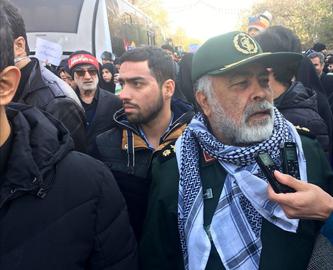
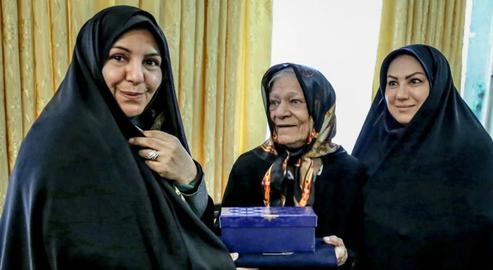
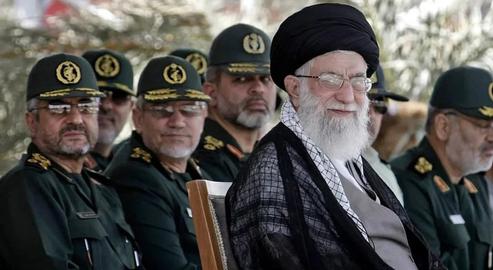







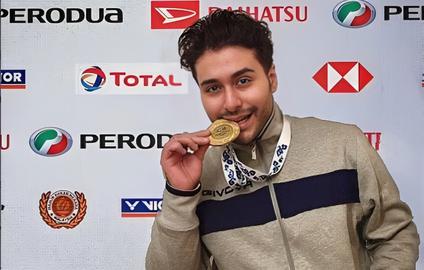
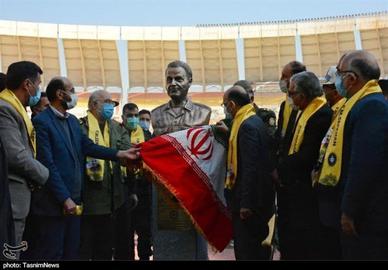
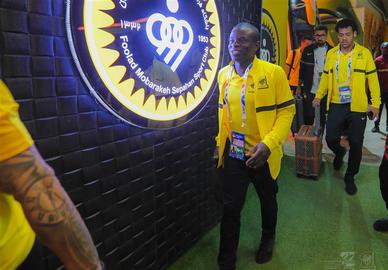






comments